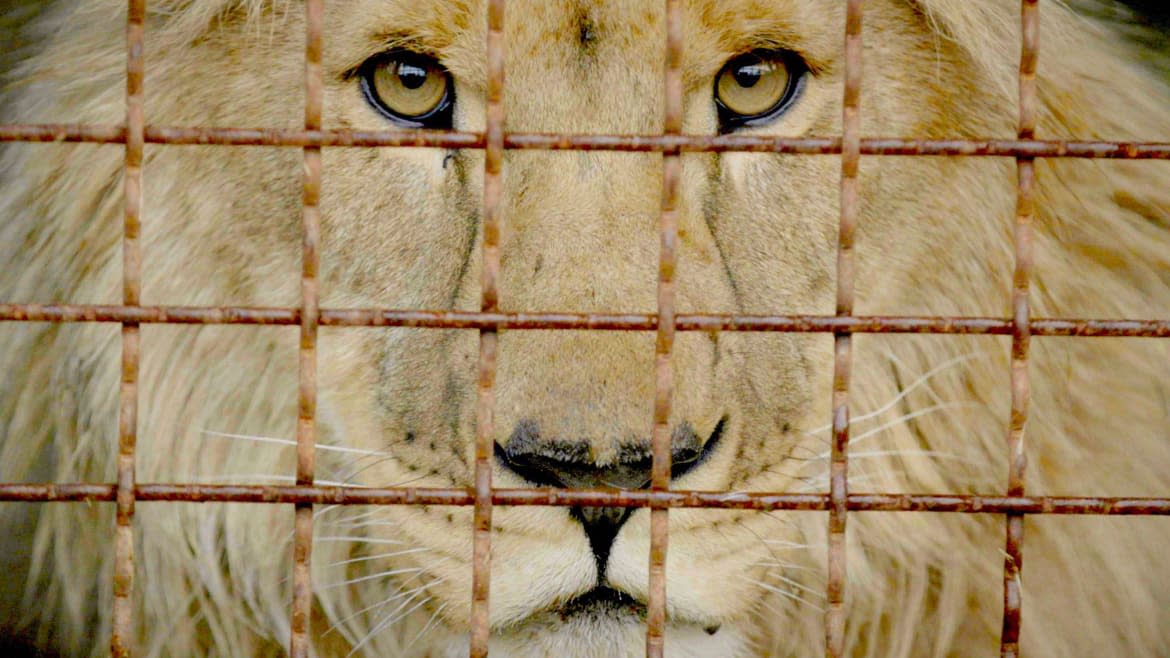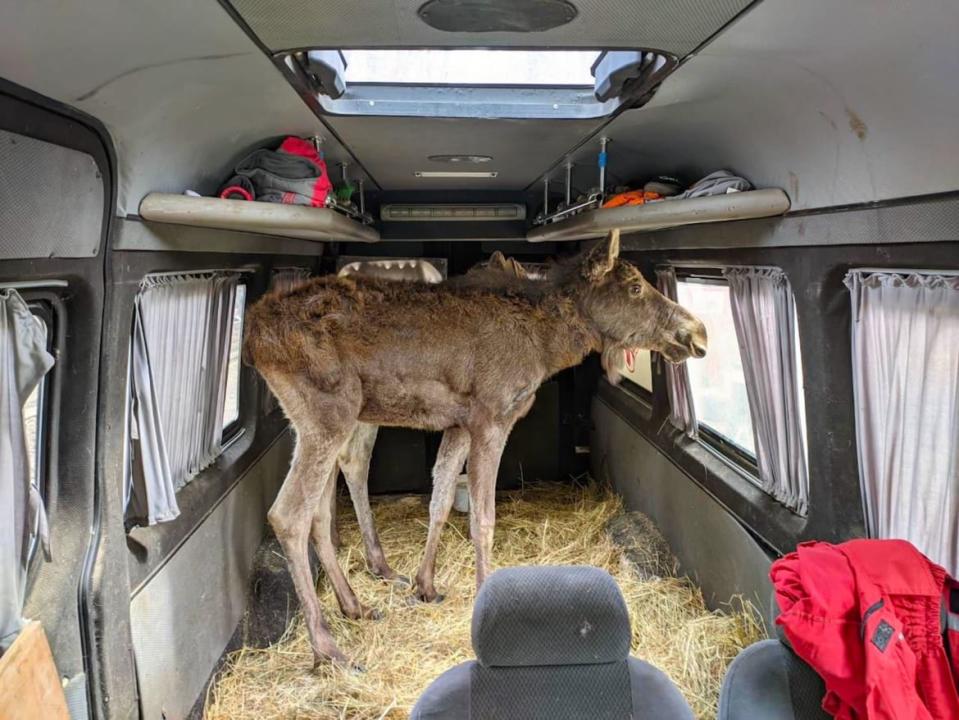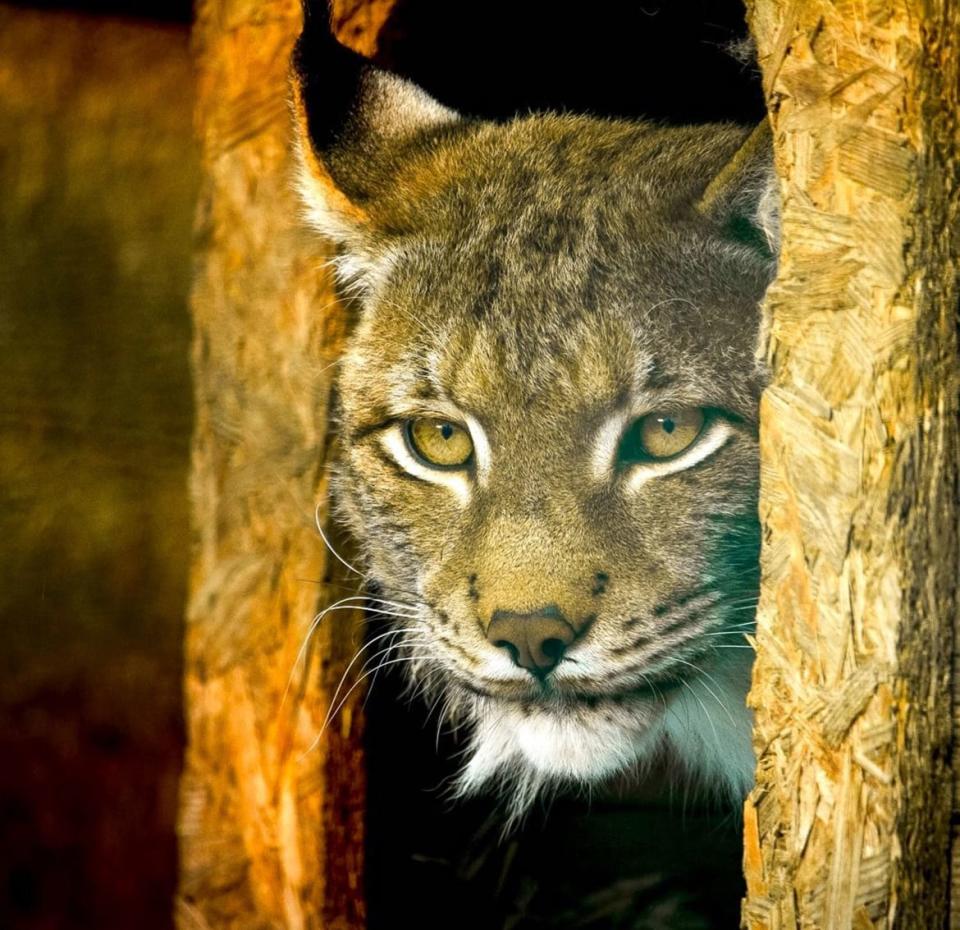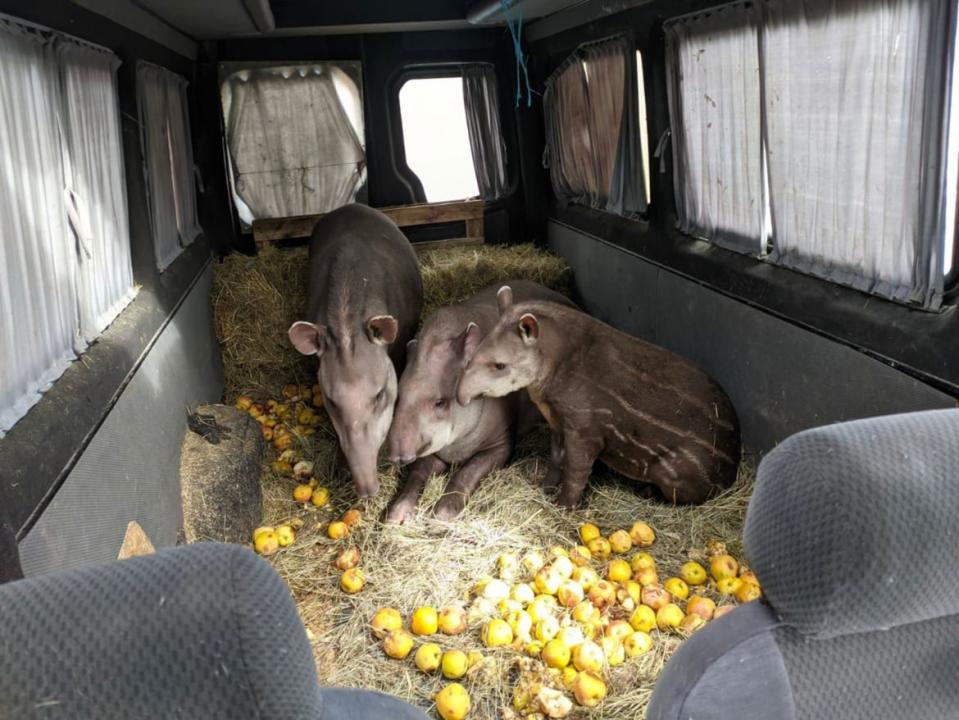How Putin Got a Man Mauled to Death by a Lion

Dodging Russian bullets and bombs, zookeepers and volunteers—who were risking their lives to save big cats, bears, apes and thousands of other creatures at a besieged Ukrainian zoo—captured hearts worldwide. The Feldman Ecopark in Kharkiv had been shelled relentlessly since the conflict began on Feb. 24, 2022. Throughout it all, a handful of fearless park staff stayed to care for the animals caught in the crossfire.
The compelling new documentary Checkpoint Zoo chronicles the extraordinary courage and compassion of a small group of men and women scrambling to evacuate 5,000 terrified and starving animals trapped in the zoo behind enemy lines.
Two years ago as the drama around Feldman Ecopark was unfolding, filmmaker Joshua Zeman had just finished filming The Loneliest Whale when he was captivated by the haunting image of a chimpanzee named Chichi walking alone around Freedom Square in Kharkiv. “Seeing this animal searching for his freedom or enjoying that freedom of escaping a zoo, while here you have this country that was under siege and fighting for its freedom and its own sovereignty immediately drew me,” he told The Daily Beast.

That solitary chimp led him to the ecopark in Kharkiv, Ukraine’s second largest city, just 15 miles from the Russian border. By coincidence, the documentary is due to premiere at the Tribeca Film Festival next month just as war returns to the Kharkiv region in President Vladimir Putin’s latest offensive. “It was the first time I filmed in a conflict zone, only six months into the war, and it was still quite hot with bombings and missiles,” said Zeman, the boyish-looking fortysomething director best known for his true-crime docuseries The Sons of Sam, Murder Mountain and the critically acclaimed Cropsey. He was speaking from an editing suite in New York ahead of the doc’s run at the film festival. “But I knew we had a great story. I had these characters, these five different kids who were innocent in some respects, but they were also their own little soldiers in their own little war.”
Stitching together a vivid mix of gorgeous cinematography, intimate interviews and a patchwork of gritty footage captured by the rescuers and news media in those fateful days, Zeman created a work of heart-stopping suspense and tenderness. The documentary, detailing the day-to-day struggles and dangers these people faced as they frantically rushed around in sub-zero temperatures feeding the animals, while the shells rained down around them, is so immersive that we often feel like we’re right there with them living through the horrors of it all.
The film’s chilling opening shot against a black screen with whispering, roaring lions and bombs exploding like distant thunder, followed by half a dozen men carrying a tranquilized lion into a van and a breaking news bulletin of the Russian invasion of Ukraine, offers a gripping snapshot of human passion at its best and its worst.
This Could Be the Moment Putin Wins the War in Ukraine
Zeman set out to tell a story of hope in the chaos and tragedy of conflict by “showing the human construct of war through the eyes of animals, who are acutely aware of the danger and destruction, but have no understanding of it.”
Scenes of frightened ostrich, deer and antelopes running from the rumbling explosions, or monkeys, lions and leopards staring in terror into the fiery night sky, alternating with footage of frightened people surging into train stations, showed the sheer brutality of war in real time.

“We’re always drawn to those moments where we’re so wrapped up being human and all its foibles and here we have an opportunity to step back and look at ourselves through the animals’ eyes. Hopefully that gives us a better perspective of how we’re treating each other. We don’t talk that much about animals in war. Though that’s changing as we have more conflicts, more climate change. Like [Hurricane] Katrina, when they were trying to save all these elderly people and they refused to leave without their cats and dogs. By talking about animals, it’s a much richer subject and you can actually bring out more humanity. I’ve learned more about humanity from animals than from other people.”
In one scene, a female keeper is seen falling on her knees in despair and comforting the tapirs. ‘My children, I’m sorry for the way you’re living,’ she says, stroking them. It was a touching moment that showed the deep bond between the juvenile tapirs and their human caretaker. “That was a very interesting part of this story, with Svitlana kneeling down, to understand that animals are not pets, nor creatures to be gawked at behind cages for entertainment. These animals are their children.”
The bodies of two keepers, who stayed behind and were reported missing, were later found in a barn with bullet wounds. One had a bucket of carrots in his hands, the other dog food. The glass enclosure of the rabbits and hamsters was used as a shooting range and all the animals were shot dead. The park staff posted a desperate plea for help on their social media. Tymofii, a young Polish vet, made the risky trip to volunteer. Arriving in an apocalyptic landscape of bombed-out structures and burnt-out trees in the deserted park, he started feeding the predators, who hadn’t eaten in a week. The next day he returned with his friends. One of the lions, distressed from the constant shelling, caught a volunteer by his coat sleeve and dragged him into his enclosure. The volunteer died in his friends’ arms before an ambulance came. Despite the obvious peril, Tymofii and the other boys, barely in their twentiess but with a single-minded devotion to the animals, continued to go back.
“When these kids went in to save these animals, people were asking, ‘How can you risk your life for an animal?’ What I found fascinating is that some people would ask that question and other people would answer, ‘How could you not? Who’s going to fight for them?’” Zeman observed. “It’s not a zero-sum game in terms of lives. You can’t prioritize one over the other. [Human lives having more value than animal lives] is unfortunately a very old way of thinking.”
Halfway through our conversation, Zeman, looking away and blinking back tears, choked up, “Animals are hope. I saw that for these people. Anytime you deal with animal suffering it’s hard not to get emotional about it.”

In the shadow of tragedy and grief, there were plenty of sunny, joyful moments. When Tymofii, the charismatic volunteer vet, is feeding the white tigers, he laughs and says to the wildcats, ‘If the Russians come, I’ll let you out.’ The caretakers and volunteers began posting comic clips of themselves chasing rams and ostriches, catching kangaroos by the tail, being attacked by pissed-off peacocks in their attempts to move them to safety. Stephen Colbert shared the clip that went viral on The Late Show of Tymofii driving a van full of wide-eyed kangaroos staring straight into the camera, while he cheerfully sang along to Ukrainian rock music.
Delving into the delicate connection that can exist between humans and animals is what makes Checkpoint Zoo such a deeply empathetic survival story. When ‘the boys’ go to the edge of the park, dangerously close to the Russian front line, to evacuate the wild moose that are part of the reintroduction program, they greet their rescuers ‘almost with tears in their eyes and gratitude’ and allowed themselves to be taken without resistance. Walking the half-starved moose to the van as they kept eating everything along the way, Yevhen, a sweet, smiley blonde boy, is instantly smitten. “It was so interesting how each of these kids found their spirit animal,” Zeman said, laughing. “That scene with Yevhen and the moose is this magic moment, where the human-animal bond transcends everything.”
Before war, the once-peaceful park—a multi-faceted charity project spanning over 600 acres—was full of life and entirely free to visitors. Alexander Feldman, businessman, parliamentarian and philanthropist, started it in 2011 as a petting zoo before it quickly grew into a safari park of sorts, with almost 300 species, alongside rehabilitation zones for injured and orphaned wildlife and domestic rescues, and therapy programs for kids with special needs and adults with drug addiction issues.
Feldman had one of the biggest primate collections in Ukraine and brought up his first baby chimp alongside his children as a cherished family member. The day a missile hit the roof of the monkey house and two chimps and two baby orangutans died of heart attacks was among his darkest moments. In an interview in the film, cuddling a lemur, he reflects back, “I let go and cried. That grief couldn’t be described in words. Many animals died of fear. When people say animals don’t understand, that’s stupidity. They cry like us, they suffer like us. They understand absolutely everything. My heart is breaking… what can I say.”
Feldman himself is one of those quirky, emotional, true-life ‘characters’ with a childlike charm that is a documentary filmmaker’s dream. There’s another sorrowful scene where he’s standing over a dead little donkey, covered in blood with open eyes, “Here’s another victim of the Russian world. An hour ago, he was eating hay and running around with his friends,” he said through tears, closing the eyes of the dead animal. In that crushing moment, he realized that “all the animals must be evacuated. Bring them to me.” So on day 26, the evacuation began with the birds and smaller animals. Feldman’s house, less than ten miles away but out of the battle zone, was turned into Noah’s Ark. Every inch of the palatial property was occupied by the four-legged and feathered refugees. Birds, alpacas, goats and sheep took over the tennis courts, marabou storks languished at the bottom of an empty swimming pool. A caracal colonized the bathroom. Monkeys and raccoons roamed amid his priceless art, wine and car collection, which he began selling off “for pennies” to feed the animals and pay staff salaries.

“The story does have a very Schindler’s List aspect,” Zeman said. “Here’s a guy who’s like an oligarch. I don’t know if he is, but he feels like it to my American eyes. You think he’s going to be a bad guy, but then suddenly you meet him and two seconds into the conversation he’s bawling like a child. He’s a philanthropist who wants to help the animals, the kids, the drug addicts.”
Truth About the Wild Drug-Taking and Illegal Booze on Ukraine’s Front Lines
Zeman recalled another storyline of traumatized lions and tigers killing their cubs that didn’t make it into the film. “Whether they were killing their newborns or whether they were dying, there was the lack of food, the lack of nourishment and therefore the lack of milk. Some of the cats killed their young because they didn’t want them to suffer. And when you talk to Feldman about this, he’s a mess. The fact that he’s trying so hard to raise these animals and they’re killing their kittens because of human war.”
On April 5, the 41st day of Russia’s invasion, after a missile struck the big-cat compound, Feldman, once one of Ukraine’s richest men, stepped in front of a camera and delivered his urgent appeal, “The big cats compound is badly damaged. Tigers and lions miraculously survived. They can run into the streets. Today we decided to put them down or to evacuate them. But we have no idea how, no place to take them.”
It shook animal lovers not only in Ukraine but beyond. Local television rang within minutes. Hours after, he got hundreds of calls and texts from people and NGOs from all over Europe and the U.S. Trucks, transport cages and crates of food and desperately needed drugs to anesthetize the predators were sent. More than 10,000 people and organizations helped and made the mercy evacuation possible through financial donations. The Odesa and Kyiv zoos offering homes to the big cats, bears and wolves was a turning point.
The terrible plight of captive animals, especially in wartime that has been played out across cultures and centuries, calls into question if zoos should even exist. “The hard part is reconciling your own feelings about zoos and our connections with animals,” Zeman said, acknowledging that it draws us to rethink the concept of freedom itself. “Zoos were one of the best things I had growing up in New York. As an adult, I feel uncomfortable because who has the right to imprison another creature, take them out of their environment? Yet, at the same time, how do we educate young people or create a connection with animals? We have to find a different way with which to access nature.”
Stories of how thousands of animals starved to death, were shot, tortured or eaten in Berlin, Paris, Baghdad, and other cities under siege is a microcosm of what happens to a country at war. “The zoo in the center of a city, the Garden of Eden, the absolute innocence,” is seen as a symbol of survival and resistance against the forces that invaded it, Zeman said. “People want to protect the zoo. If the zoo gets lost and the animals die, then the city has surrendered its innocence.”
Checkpoint Zoo beautifully captures the essence of innocence, resilience and the interconnectedness of all living beings, as well as the continuing devastation of a country, its animals and its people, that makes it so essential and one of the year’s most important films. Zeman said: “You know Blackfish absolutely changed the world, and My Octopus Teacher showing octopi are far more brilliant and intelligent than we can ever understand. I hope that someone who might not be as empathetic to the Ukrainian plight because it has been so ridiculously polarized and our country might understand what it’s like if I show the same story through the eyes of an animal.”
Checkpoint Zoo premieres at the Tribeca Film Festival with screenings in select New York cinemas from June 6-132024.
Get the Daily Beast's biggest scoops and scandals delivered right to your inbox. Sign up now.
Stay informed and gain unlimited access to the Daily Beast's unmatched reporting. Subscribe now.


